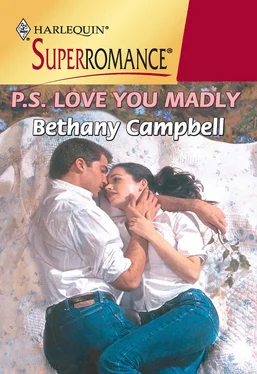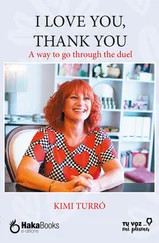He was a bookworm, a comical soft sculpture that she had been commissioned to make for the children’s section of the main library. He was four feet long, his flexible body composed of cuddly green-and-yellow globes.
He had a yellow head with a benevolently mad smile. He wore red spectacles and sported twelve pliable lavender legs. He was not exactly a handsome worm, but he was a winsome one, and Darcy was pleased with him.
This morning she had finally got his antennae right. Now she experimented, trying him in different poses. Worm—reading studiously in an armchair. Worm—standing on a library stool, reaching for a book on an upper shelf. Worm—stretched out on his belly on the floor, his head cocked over the Sunday comic papers.
You look good, Worm, she thought. You just might be a star.
She took snapshots for her files. Around her, the room was crammed with her other projects: stuffed toys, quilts, puppets, experimental clothing, fabrics she had dyed and silk-screened by hand. It was a happy hodgepodge that probably made sense to no one but her. But there was method in her madness—a great deal of method, in fact.
In Darcy Parker’s nature was an equal mix of whimsy and practicality. She was successful at what she did, although she could not explain exactly what her profession was. Sometimes she was an artist, sometimes a craftswoman, sometimes a seamstress. She had a questing curiosity, and she followed where it led.
She was a whip-slender woman with a quick mind, lively eyes and clever hands. She was thirty years old. From her father she had inherited the midnight darkness of her hair; from her mother, her quick-silver smile and fair skin. Unlike her mother, she didn’t hide from the sun, so she had a dapple of freckles sprinkling her nose and high cheekbones.
Her studio was makeshift, temporarily set up in the guest cottage of her mother’s weekend house on Lake Travis. She hadn’t wished to impose on her mother. But when the lease in downtown Austin was lost, she’d had no choice.
The lake property was for sale, so Darcy didn’t want to grow overly fond of the little house. It was airy and full of brightness, and she loved the sweeping view of the lake and the looming limestone cliffs.
There were no neighbors. She lived in splendid isolation. On Saturdays, Rose Alice, the housekeeper in town, drove out to vacuum and dust the lake house. She was a tough-looking woman with tattoos on both biceps, but she was hell on every sort of dirt. Her spanking white pickup was parked in the service driveway today.
Rose Alice didn’t touch the guest house; it was Darcy’s responsibility as long as she stayed. Besides, she didn’t like anyone disturbing the disorderly seeming order of her studio, and Rose Alice attacked clutter with the energy and ferocity of a pit bull.
Rose Alice had taken one look at the studio room after Darcy moved in, winced, and shook her head. “No offense, kid,” she said. “I love ya. But I don’t think I ought to look in here again until you’re gone. I got delicate sensibilities.”
Before Rose Alice left the main house today, she would telephone Darcy and invite her over for coffee. She had known the family for almost twenty years, and, in her rough-spoken way, was fond of them.
“In the meantime, it’s you and me,” Darcy told the worm. “Want to curl up with a good book?” She wound him into a coil and put an oversize picture book in his grasp.
Darcy was kneeling to snap his picture, when her phone rang. It was Rose Alice.
“Hey, Darcy,” she said in her sandpapery voice, “storm warning. The kid just drove up. She don’t look happy. Something’s wrong.”
Darcy stiffened in apprehension. She loved her sister, but Rose Alice’s tone was full of foreboding. “Oh,” said Darcy. “Thanks.”
“Batten down the hatches,” said Rose Alice, and hung up.
With a sigh, Darcy set down the receiver and put aside her camera. There’d be no work done if Emerald was having a crisis. It had seemed lately to Darcy that perhaps both her sister and mother were calming down, getting their lives in order at last. Nothing could please her more. But Rose Alice’s message was clear: it wouldn’t happen today.
She heard Emerald stamping across the concrete service drive toward the guest house. Curtain going up, thought Darcy. Let the drama begin.
Emerald didn’t knock. She burst through the door, clanking. She wore a good deal of chain mail and a buckler and sword. Her short hair was tousled by the spring wind, and her cheeks were red as flame.
She had been at the Pecan Street Festival with her fellow members of the Medieval Society. The Medieval Society usually turned out for the event in full costume, as knights or damsels or wizards or monks or warlocks. Emerald was presently in her warrior maiden phase, which she had described as “sort of Joan of Arc without the religion or politics.”
Darcy crossed her arms and allowed herself the smallest of smiles. “This is unexpected. Why aren’t you at the fair, jousting or minnesinging or whatever you do?”
“Somebody stepped on my lute, the clod,” Emerald said with passion. “I had to go home for my other one.”
“Hmm, sounds serious. When a man breaks your lute, doesn’t that mean you’re engaged—or should be?”
Emerald flashed her a resentful look. “You always want to make a joke out of everything. This is serious.”
Darcy shrugged. “I’m sorry. Can it be restored to its former virginal state? Do you need a lute-repair loan?”
Emerald put her gloved hands on her hips. “This isn’t about the lute, Darcy. This is about Mama. I’m very worried about her.”
Darcy gave her sister a skeptical look. “Mama’s fine,” she said. “She just had her physical. The doctor said she’s in wonderful shape.”
“Mom’s in fabulous shape,” Emerald said, tossing her head. “That’s never been the problem—has it?”
“No,” Darcy admitted, but she thought, It hasn’t been much of a solution, either.
Their mother, Olivia, had been a great beauty in her day. She was still stunning, tall and shapely, with platinum-blond hair she wore in a sleek chignon.
Emerald was small and wiry and brown-haired, like her father, and she had inherited their mother’s blue eyes. Darcy had her mother’s height, but she was dark-eyed and slim like her father.
Olivia had married three times. Now she was a widow, and if she was not exactly merry, she seemed content with her lot. She’d lived in Austin for the past twenty years, but had grown up Portland, Maine. When her third husband had died last autumn, she’d waited a decent interval, then bought a vacation condo back in Maine.
She wanted to spend her summers on the seacoast she’d loved as a girl. For the past month she’d been in Portland, working on the condo with a decorator.
“Oh, God,” Emerald said in exasperation. She threw herself down in the studio’s one armchair. This caused more clanking, and her sword stuck out at an awkward angle. “I don’t even know how to tell you this.”
“Would you take off that sword? You’re going to run it through either my cushion or yourself.”
Emerald ignored her. She threw back her head and stared at the ceiling dramatically. She sighed.
“I mean,” Darcy said, brushing back a dark strand of hair, “if you went home, why didn’t you take off the sword? Why didn’t you change clothes? You didn’t have to come stomping in here sounding like a bag of hubcaps.”
“I was too upset,” Emerald said, and scowled harder at the ceiling.
“Upset why?” Darcy demanded. “You said it’s about Mother. What is it?”
“I’m trying to tell you,” Emerald said righteously. She put her gloved hand over her mailed heart. “Oh, Gad.”
Читать дальше


![Ally Carter - [Gallagher Girls 01] I'd Tell You I Love You But Then I'd Have to Kill You](/books/262179/ally-carter-gallagher-girls-01-i-d-tell-you-i-lo-thumb.webp)









